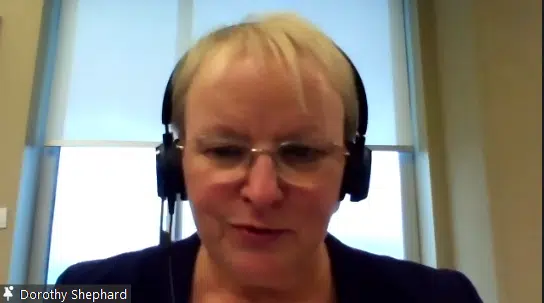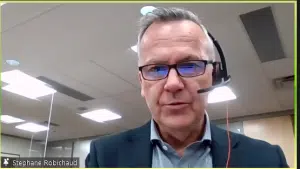
Health Minister Dorothy Shephard takes part in a public consultation on the future of health care in the province. (Image: Zoom video capture)
The Saint John health engagement session for the provincial health plan started off with a promise from the health minister.
Dorothy Shephard said she wanted to make clear these sessions are not public relations exercises.
“We do not have a plan that is already drafted, there’s nothing that’s been put to paper with the exception of the fact that the premier has committed to the communities in this province that we will not close, or change or alter hours to our existing ER centres,” she said.
Shephard said there have been some recurring themes brought up in these sessions, including transportation and access to primary healthcare.
She said there’s also been a need expressed to retain health care students within the province by better communicating opportunities.
Shephard said she believes every facility has a role to play in how healthcare services are delivered.

Stephane Robichaud, the chief executive officer at the New Brunswick Health Council.
(Image: Zoom video capture)
Stephane Robichaud, CEO of the New Brunswick Health Council, said in 2008 the council had to address challenges, including measuring population health.
He presented a 2017 report conducted as part of their double mandate in reporting on the health system and making its annual recommendations to the health minister.
“We came across this model which really underlines the importance of what’s called determinants of health,” he said.
Robichaud said there are four different determinants they use to build community profiles to help residents understand health in their community.
They include if the population diagnosed or treated for three or more chronic health conditions; if they’re confident in managing their chronic health condition; if they can get a family doctor appointment within five days; and if they use the emergency room as a regular place of care.
“In recent years, the life expectancy is actually reduced in New Brunswick and some of that is because of some of these health determinants,” he said.
More than 50 people were sorted into rooms with facilitators to discuss their concerns.
Issues raised included:
- flipping into privatization in health care with areas where that’s already happened resulting in health care quality declining
- preventative medicine
- access to long-term care with the idea that emergency services and hospitals would be alleviated
- recruitment and retention of medical staff
- better utilization of nurse practitioners
- primary care clinics
- clinics with multiple services
- more access to mental health and addictions services
- virtual care clinics to alleviate pressure
- socio-economic factors and how they play a role in health and the focus on those concerns to alleviate pressure on healthcare
- access to care in mother tongue
- lack of access to family doctors
- some people have to travel to see specialists
- recruitment and retention for staff members who are burning out, including long-term care workers and hospital staff
- Saint John has shortages of nurses and their staff are having difficulties taking time off
- wages are making people leave New Brunswick for less stress and higher pay
- coordination for social development and health care to tackle social determinants
- the dental community has lost operating room time for emergencies resulting in an almost 15-month wait
- regarding coordination of services is a sharing of services like meals on wheels using kitchens in care homes in off-hours
Specifically cited in one of the rooms were difficulties for the deaf community.
When the deaf community needs to go to walk-in clinics and has to use ASL services, they have to call in advance.
One solution suggested would be to create designated clinics for those services.
“Recently in Saint John, the Irving [Oil] Refinery created an evacuation. The EMO was part of that. The deaf community wasn’t contacted immediately,” said one of the facilitators.
Shephard said they’ve held an engagement session with the disability community as part of the consultations and there was good representation there.
“(In terms of) the ASL services, a really good friend of mine who happened to just have her 85th birthday is hearing impaired and so I know the importance of this very valuable service,” she said
Shephard said information gathered during the sessions will be given to the regional health authorities but they will continue to assess after the health plan is completed.
There are seven more sessions scheduled for this month. Community members are encouraged to submit feedback by emailing healthplansante@gnb.ca.






